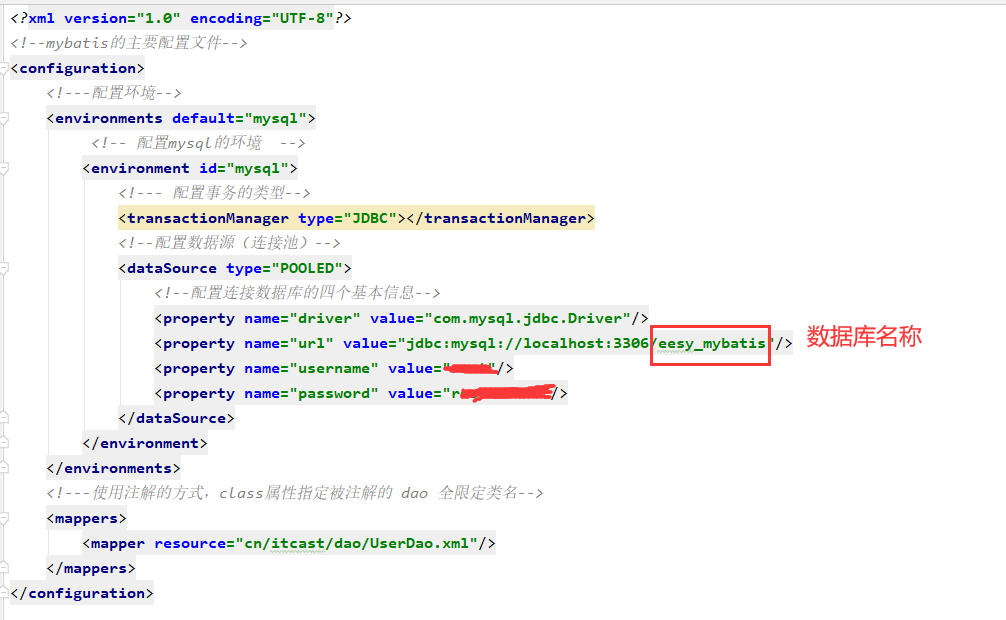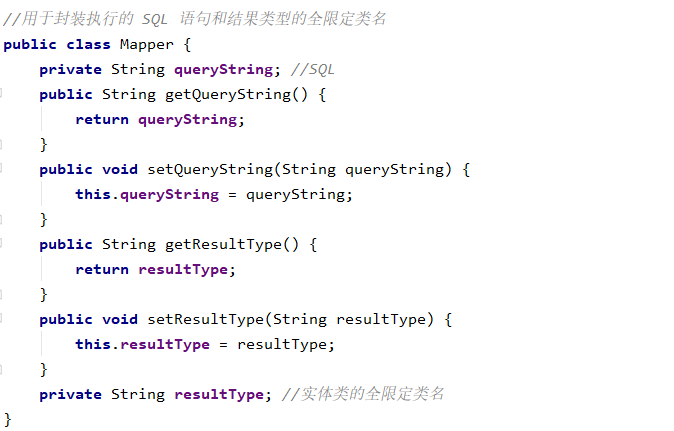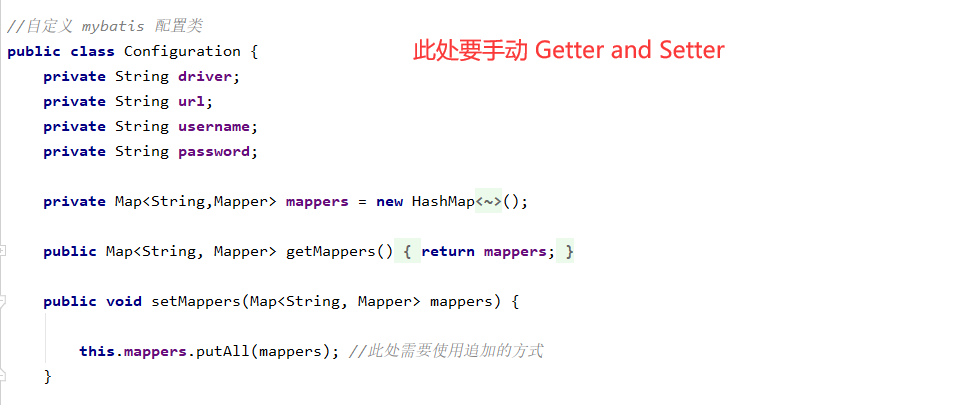创建 Maven 工程

引入相关的依赖

解析 xml 的 dom4j dom4j的依赖包jaxen
引入工具类
XMLConfigBuilder 和 Executor 黑马程序员写的 ,借用一下 ,非商用 ,请见谅哈!

/** * @author 黑马程序员 * 用于解析配置文件 */ public class XMLConfigBuilder { /** * 解析主配置文件,把里面的内容填充到DefaultSqlSession所需要的地方 * 使用的技术: * dom4j+xpath */ public static Configuration loadConfiguration(InputStream config){ try{ //定义封装连接信息的配置对象(mybatis的配置对象) Configuration cfg = new Configuration(); //1.获取SAXReader对象 SAXReader reader = new SAXReader(); //2.根据字节输入流获取Document对象 Document document = reader.read(config); //3.获取根节点 Element root = document.getRootElement(); //4.使用xpath中选择指定节点的方式,获取所有property节点 List<Element> propertyElements = root.selectNodes("//property"); //5.遍历节点 for(Element propertyElement : propertyElements){ //判断节点是连接数据库的哪部分信息 //取出name属性的值 String name = propertyElement.attributeValue("name"); if("driver".equals(name)){ //表示驱动 //获取property标签value属性的值 String driver = propertyElement.attributeValue("value"); cfg.setDriver(driver); } if("url".equals(name)){ //表示连接字符串 //获取property标签value属性的值 String url = propertyElement.attributeValue("value"); cfg.setUrl(url); } if("username".equals(name)){ //表示用户名 //获取property标签value属性的值 String username = propertyElement.attributeValue("value"); cfg.setUsername(username); } if("password".equals(name)){ //表示密码 //获取property标签value属性的值 String password = propertyElement.attributeValue("value"); cfg.setPassword(password); } } //取出mappers中的所有mapper标签,判断他们使用了resource还是class属性 List<Element> mapperElements = root.selectNodes("//mappers/mapper"); //遍历集合 for(Element mapperElement : mapperElements){ //判断mapperElement使用的是哪个属性 Attribute attribute = mapperElement.attribute("resource"); if(attribute != null){ System.out.println("使用的是XML"); //表示有resource属性,用的是XML //取出属性的值 String mapperPath = attribute.getValue();//获取属性的值"cn/itcast/dao/UserDao.xml" //把映射配置文件的内容获取出来,封装成一个map Map<String, Mapper> mappers = loadMapperConfiguration(mapperPath); //给configuration中的mappers赋值 cfg.setMappers(mappers); }else{ // System.out.println("使用的是注解"); // //表示没有resource属性,用的是注解 // //获取class属性的值 // String daoClassPath = mapperElement.attributeValue("class"); // //根据daoClassPath获取封装的必要信息 // Map<String,Mapper> mappers = loadMapperAnnotation(daoClassPath); // //给configuration中的mappers赋值 // cfg.setMappers(mappers); } } //返回Configuration return cfg; }catch(Exception e){ throw new RuntimeException(e); }finally{ try { config.close(); }catch(Exception e){ e.printStackTrace(); } } } /** * 根据传入的参数,解析XML,并且封装到Map中 * @param mapperPath 映射配置文件的位置 * @return map中包含了获取的唯一标识(key是由dao的全限定类名和方法名组成) * 以及执行所需的必要信息(value是一个Mapper对象,里面存放的是执行的SQL语句和要封装的实体类全限定类名) */ private static Map<String,Mapper> loadMapperConfiguration(String mapperPath)throws IOException { InputStream in = null; try{ //定义返回值对象 Map<String,Mapper> mappers = new HashMap<String,Mapper>(); //1.根据路径获取字节输入流 in = Resources.getResourceAsStream(mapperPath); //2.根据字节输入流获取Document对象 SAXReader reader = new SAXReader(); Document document = reader.read(in); //3.获取根节点 Element root = document.getRootElement(); //4.获取根节点的namespace属性取值 String namespace = root.attributeValue("namespace");//是组成map中key的部分 //5.获取所有的select节点 List<Element> selectElements = root.selectNodes("//select"); //6.遍历select节点集合 for(Element selectElement : selectElements){ //取出id属性的值 组成map中key的部分 String id = selectElement.attributeValue("id"); //取出resultType属性的值 组成map中value的部分 String resultType = selectElement.attributeValue("resultType"); //取出文本内容 组成map中value的部分 String queryString = selectElement.getText(); //创建Key String key = namespace+"."+id; //创建Value Mapper mapper = new Mapper(); mapper.setQueryString(queryString); mapper.setResultType(resultType); //把key和value存入mappers中 mappers.put(key,mapper); } return mappers; }catch(Exception e){ throw new RuntimeException(e); }finally{ in.close(); } } /** * 根据传入的参数,得到dao中所有被select注解标注的方法。 * 根据方法名称和类名,以及方法上注解value属性的值,组成Mapper的必要信息 * @param daoClassPath * @return */ // private static Map<String,Mapper> loadMapperAnnotation(String daoClassPath)throws Exception{ // //定义返回值对象 // Map<String,Mapper> mappers = new HashMap<String, Mapper>(); // // //1.得到dao接口的字节码对象 // Class daoClass = Class.forName(daoClassPath); // //2.得到dao接口中的方法数组 // Method[] methods = daoClass.getMethods(); // //3.遍历Method数组 // for(Method method : methods){ // //取出每一个方法,判断是否有select注解 // boolean isAnnotated = method.isAnnotationPresent(Select.class); // if(isAnnotated){ // //创建Mapper对象 // Mapper mapper = new Mapper(); // //取出注解的value属性值 // Select selectAnno = method.getAnnotation(Select.class); // String queryString = selectAnno.value(); // mapper.setQueryString(queryString); // //获取当前方法的返回值,还要求必须带有泛型信息 // Type type = method.getGenericReturnType();//List<User> // //判断type是不是参数化的类型 // if(type instanceof ParameterizedType){ // //强转 // ParameterizedType ptype = (ParameterizedType)type; // //得到参数化类型中的实际类型参数 // Type[] types = ptype.getActualTypeArguments(); // //取出第一个 // Class domainClass = (Class)types[0]; // //获取domainClass的类名 // String resultType = domainClass.getName(); // //给Mapper赋值 // mapper.setResultType(resultType); // } // //组装key的信息 // //获取方法的名称 // String methodName = method.getName(); // String className = method.getDeclaringClass().getName(); // String key = className+"."+methodName; // //给map赋值 // mappers.put(key,mapper); // } // } // return mappers; // } }

/** * @author 黑马程序员 * 负责执行SQL语句,并且封装结果集 */ public class Executor { public <E> List<E> selectList(Mapper mapper, Connection conn) { PreparedStatement pstm = null; ResultSet rs = null; try { //1.取出mapper中的数据 String queryString = mapper.getQueryString();//select * from user String resultType = mapper.getResultType();//com.itheima.domain.User Class domainClass = Class.forName(resultType); //2.获取PreparedStatement对象 pstm = conn.prepareStatement(queryString); //3.执行SQL语句,获取结果集 rs = pstm.executeQuery(); //4.封装结果集 List<E> list = new ArrayList<E>();//定义返回值 while(rs.next()) { //实例化要封装的实体类对象 E obj = (E)domainClass.newInstance(); //取出结果集的元信息:ResultSetMetaData ResultSetMetaData rsmd = rs.getMetaData(); //取出总列数 int columnCount = rsmd.getColumnCount(); //遍历总列数 for (int i = 1; i <= columnCount; i++) { //获取每列的名称,列名的序号是从1开始的 String columnName = rsmd.getColumnName(i); //根据得到列名,获取每列的值 Object columnValue = rs.getObject(columnName); //给obj赋值:使用Java内省机制(借助PropertyDescriptor实现属性的封装) PropertyDescriptor pd = new PropertyDescriptor(columnName,domainClass);//要求:实体类的属性和数据库表的列名保持一种 //获取它的写入方法 Method writeMethod = pd.getWriteMethod(); //把获取的列的值,给对象赋值 writeMethod.invoke(obj,columnValue); } //把赋好值的对象加入到集合中 list.add(obj); } return list; } catch (Exception e) { throw new RuntimeException(e); } finally { release(pstm,rs); } } private void release(PreparedStatement pstm,ResultSet rs){ if(rs != null){ try { rs.close(); }catch(Exception e){ e.printStackTrace(); } } if(pstm != null){ try { pstm.close(); }catch(Exception e){ e.printStackTrace(); } } } }
DataSourceUntil

编写 config.xml

编写读取配置文件类 Resources

编写 Mapper 类

编写 Configuration 配置类

图中的map 集合 Map<唯一标识,Mapper> 用于保存映射文件中的 sql 标识及 sql 语句
编写 User 实体类

此处需要添加 Getter and Setter 方法和 toString 方法
编写持久层接口 和 UserDao.xml
接口 UserDao 如下 :

UserDao.xml 如下:

